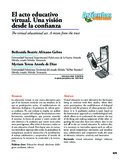| dc.rights.license | http://creativecommons.org/licenses/by-nc-sa/3.0/ve/ | es_VE |
| dc.contributor.author | Africano Gelves, Bethzaida Beatriz | |
| dc.contributor.author | Anzola, Myriam | |
| dc.date.accessioned | 2018-09-27T14:31:23Z | |
| dc.date.available | 2018-09-27T14:31:23Z | |
| dc.date.issued | 2018-09 | |
| dc.identifier.issn | 1316-4910 | |
| dc.identifier.uri | http://www.saber.ula.ve/handle/123456789/45245 | |
| dc.description.abstract | La educación virtual, es una nueva alternativa para que el ser humano continúe con sus estudios, en la que su participación activa, el establecimiento de relaciones dialógicas y la presencia de valores genera confianza. En este trabajo se emplea un análisis cualitativo, a partir del enfoque hermenéutico como herramienta metodológica, que permite entender el accionar, la forma de pensar y emitir juicios del otro relativos a la confianza que tienen unos sobre otros participantes, ellos sobre el docente y todos en el acto educativo virtual. Para lograr esto, es necesario internalizar aspectos tales como: la autoestima; la competencia social; la interacción y la socialización; el trabajo colaborativo y cooperativo; el sentido de pertinencia, la iniciativa, la creatividad y la innovación. | es_VE |
| dc.language.iso | es | es_VE |
| dc.publisher | SABER-ULA | es_VE |
| dc.rights | info:eu-repo/semantics/openAccess | es_VE |
| dc.subject | Educación virtual | es_VE |
| dc.subject | Relaciones dialógicas | es_VE |
| dc.subject | Confianza | es_VE |
| dc.subject | Valores | es_VE |
| dc.title | El acto educativo virtual. Una visión desde la confianza | es_VE |
| dc.title.alternative | The virtual educational act. A vision from the trust | es_VE |
| dc.type | info:eu-repo/semantics/article | es_VE |
| dcterms.dateAccepted | 16/07/2018 | |
| dcterms.dateSubmitted | 01/06/2018 | |
| dc.description.abstract1 | Virtual education is a new alternative for the human being to continue with their studies, where their active participation, the establishment of dialogical relations and the presence of values generates confidence in it. A qualitative analysis is used, based on the hermeneutic approach as a methodological tool, which allows us to understand the actions, the way of thinking and making judgments of the other regarding the trust they have over others, they in one and all in the act virtual education To achieve this, it is necessary to internalize aspects such as: self-esteem; social competence; interaction and socialization; collaborative and cooperative work; the sense of relevance, initiative, creativity and innovation | es_VE |
| dc.description.colacion | 521 - 531 | es_VE |
| dc.description.email | africanogelves@gmail.com | es_VE |
| dc.description.email | anzolamyriam08@gmail.com | es_VE |
| dc.description.frecuencia | Cuatrimestral | |
| dc.identifier.depositolegal | pp199702ME1027 | |
| dc.identifier.edepositolegal | pp199702ME1927 | |
| dc.publisher.pais | Venezuela | es_VE |
| dc.subject.facultad | Facultad de Humanidades y Educación | es_VE |
| dc.subject.institucion | Universidad de Los Andes | es_VE |
| dc.subject.keywords | Virtual education | es_VE |
| dc.subject.keywords | Dialogic relations | es_VE |
| dc.subject.keywords | Trust | es_VE |
| dc.subject.keywords | Values | es_VE |
| dc.subject.publicacionelectronica | Revista Educere | |
| dc.subject.seccion | Revista Educere: Artículos Arbitrados | es_VE |
| dc.subject.thematiccategory | Artes y Humanidades | es_VE |
| dc.subject.tipo | Revistas | es_VE |
| dc.type.media | Texto | es_VE |


